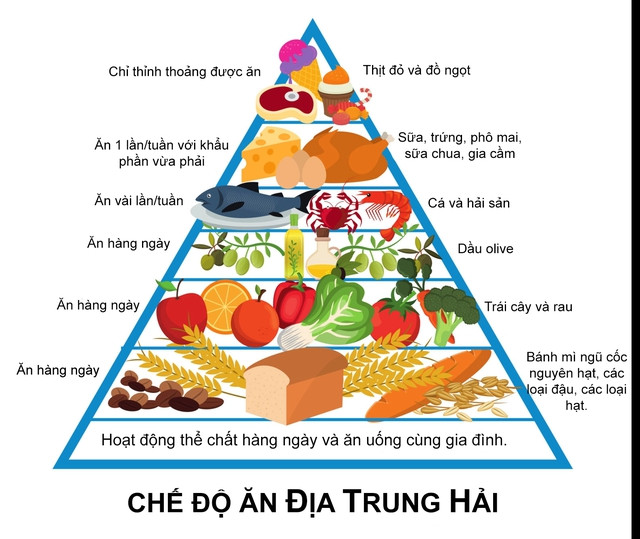Dietary suggestions to help reduce the harmful effects of tobacco
A Mediterranean diet with healthy, balanced foods reduces the risk of asthma caused by secondhand smoke.
Smoking causes many health and economic burdens.
Cigarette smoke is not only toxic to the body of the direct smoker but also affects the health of passive smokers. According to statistics, every year 7 million people die from the harmful effects of tobacco, of which 1 million die from passive smoking.
According to estimates by the World Health Organization (WHO), the global economic loss caused by tobacco is 1,400 billion USD each year. Smoking is the main cause of stroke, coronary heart disease, chronic obstructive pulmonary disease, lung cancer,...
Cigarettes contain 4,000 toxic substances, including more than 70 carcinogens that are not only toxic to smokers but also to passive smokers, especially affecting the health of children, the elderly and women. These toxic substances cause diseases in almost all organs of the body. In Vietnam, WHO statistics show that the cost of treating 5 groups of diseases out of 25 diseases caused by tobacco accounts for 1% (converted) of GDP (about 67,000 billion VND).
Mediterranean diet reduces the effects of smoking
The Mediterranean diet, often linked to a reduced risk of heart disease and cancer, may also reduce the effects of secondhand smoke, according to a study in the scientific journal Annals of the American Thoracic Society.
Researchers conducted this cross-sectional study of 7,000 nonsmoking adolescents exposed to environmental tobacco smoke. This exposure was measured using serum cotinine, a marker of nicotine intake. The aim of the study was to assess whether a better quality diet was associated with improvements in respiratory symptoms and lung function in adolescents. According to the study results, those who ate a Mediterranean diet did have improvements in these symptoms.

The Mediterranean diet is a diet inspired by the foods of countries bordering the Mediterranean Sea, such as Greece, France, Spain, and Southern Italy. Like many other diets, the Mediterranean diet focuses on regularly consuming healthy foods such as vegetables, fruits, fish, and whole grains, but places more emphasis on foods that are unique to the Mediterranean region, such as fish.
The Mediterranean diet is truly based on a balanced and flexible menu that will even be the secret to the good health of those who follow it. The Mediterranean diet focuses on foods according to the rules:
Eat at least 5 types of fruits and vegetables every day. Limit saturated fat intake (cold cuts, cakes, pastries, etc.). Consume moderate protein from meat, fish, eggs, etc. 1-2 times a day. Increase slow sugar intake, in the form of whole grains (bread, pasta, tapioca, etc.). Drink at least 1.5 liters of water every day.
Nutritionists say the Mediterranean diet perfectly meets the needs of a varied and balanced diet. In addition to preventing the risk of cardiovascular disease and some cancers, it may reduce the harmful effects of secondhand smoke, which is responsible for 3,000-5,000 deaths a year. However, further research is needed to support this finding.
Tips for following the Mediterranean diet
While there are no specific rules for how to follow the Mediterranean diet, there are many general guidelines you can follow to incorporate the diet's principles into your daily routine.
Use olive oil in all types of sauces.

Instead of butter, margarine, sunflower oil or any other fat, use olive oil as a main ingredient in the Mediterranean diet in sauces. Olive oil is a rich source of antioxidants, especially vitamin E. It also contains monounsaturated fatty acids that promote good cholesterol and protect against heart disease. Consuming extra virgin olive oil has been shown to reduce inflammation, detoxify the liver, and reduce the risk of damage caused by cigarette smoke through its powerful antioxidant activities.
Reduce red meat consumption
Mediterranean people have a very moderate meat consumption, especially avoiding red meat and processed meat. They like to eat fish or eggs, which is very beneficial for their health because according to a study by the US National Cancer Institute, consuming a lot of red meat will increase the death rate from cancer or cardiovascular disease.
Regularly eat oily fish
The Mediterranean diet favors salmon, mackerel, sardines... which are fatty fish rich in omega-3. They are a valuable source of polyunsaturated omega-3 fatty acids, which have anti-inflammatory and vasodilating properties that ensure good blood circulation. Fatty fish also contribute to normal brain function and prevent age-related macular degeneration (AMD). In addition to the above fish, you can also eat seafood such as shrimp, oysters, clams, crabs, mussels, etc. Fish and seafood are recommended at least twice a week.

Eat fruits and vegetables in moderation
The Mediterranean diet is also distinguished by its high proportion of raw, cooked or dried fruits and vegetables. These products are widely known to protect against age-related diseases, possibly due to their high antioxidant content. Various studies have shown that people who follow the principles of the Mediterranean diet live 2-3 years longer on average.
Avoid the following foods
Avoid sugary products such as soft drinks, candy, ice cream, sugar, etc. Eliminate refined grains such as white bread, pasta made from milled barley, etc. Replace trans fats in margarine and refined oils with olive oil. Limit consumption of processed meats and processed foods.
It should be noted that diet is only part of the secret to a healthy and long life for people in the Mediterranean region. Mediterranean people often prefer to use herbs and spices instead of salt, drink water regularly and eat seasonal fruits and vegetables. In addition, they also maintain an active lifestyle by walking regularly and building good relationships with the community. Building a diet and living in this style will help improve both physical and mental health./.


